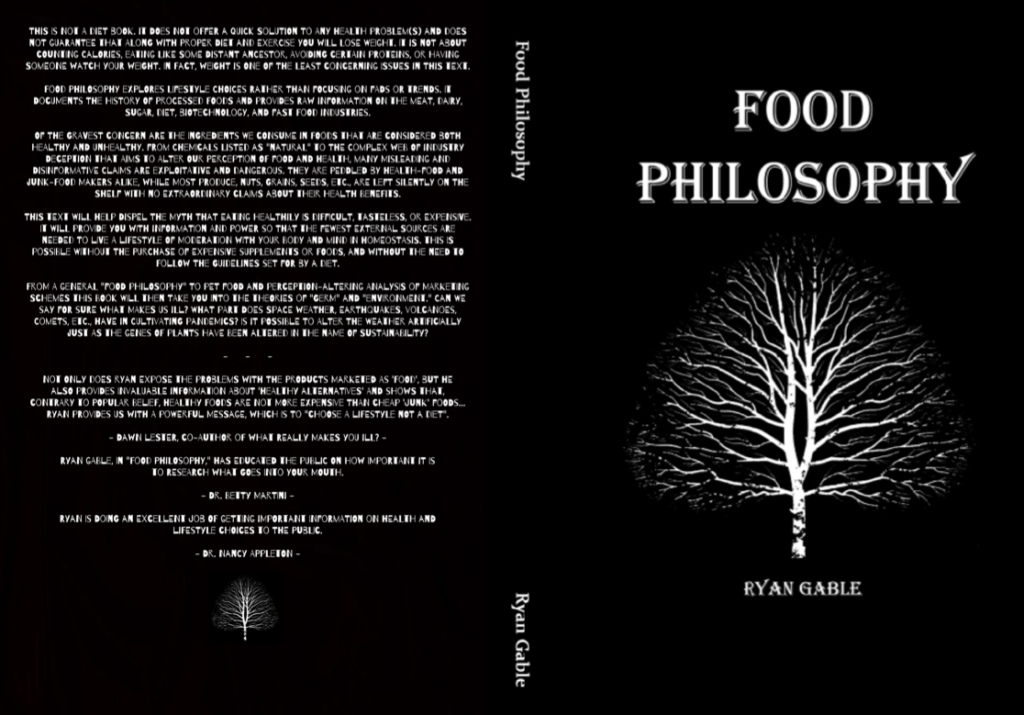Food Philosophy BOOK

For physical copies click the Stripe link…

For digital copies, please use CashApp while we work on other options. The cost is $5 for PDF. After using the app below, please email rdgable@yahoo.com so the link can be sent to you.

Book Overview
(6×9 — 386 pages of content)
This is not a diet book. It does not offer a quick solution to any health problem(s) and does not guarantee that along with proper diet and exercise you will lose weight. It is not about counting calories, eating like some distant ancestor, avoiding certain proteins, or having someone watch your weight. In fact, weight is one of the least concerning issues in this text.
Food Philosophy explores lifestyle choices rather than focusing on fads or trends. It documents a history of processed foods and provides raw information on the meat, dairy, sugar, diet, biotechnology, and fast food industries.
Of the gravest concern are the ingredients we consume in foods that are considered both healthy and unhealthy. From chemicals listed as “natural” to the complex web of industry deception that aims to alter our perception of food and health. Many misleading and disinformative claims are exploitative and dangerous. They are peddled by health-food and junk-food makers alike, while most produce, nuts, grains, seeds, etc., are left silently on the shelf with no extraordinary claims about their health benefits.
This text will help dispel the myth that eating healthily is difficult, tasteless, or expensive. It will provide you with information and therefore power so that the fewest external sources are needed to live a lifestyle of moderation with your body and mind in homeostasis. This is possible without the purchase of expensive supplements or foods, and without the need to follow the guidelines set for by a diet.
From a general “food philosophy” to pet food and perception-altering analysis this book will then take you into the theories of “germ” and “environment.” Can we say for sure what makes us ill? What part does space weather, earthquakes, volcanoes, comets, etc., have in cultivating pandemics? Is it possible to alter the weather artificially just as the genes of plants have been altered in the name of sustainability?
Reviews
Ryan Gable, in “Food Philosophy,” has educated the public on how important it is to research what goes into your mouth.
!
– Dr. Nancy Appleton – author of Suicide by Sugar
Ryan is doing an excellent job of getting important information on health and lifestyle choices to the public.
~
Dawn Lester – co-author of What Really Makes You Ill? Why Everything You Thought You Knew About Disease Is Wrong
The basic definition of the word ‘philosophy’ refers to the study of knowledge. The information gained through such a study is conveyed to others through words, which must be clearly defined and used correctly. It is, however, increasingly common for those with vested interests to distort the meanings of words and use them incorrectly in order to convey a particular message; one that suits their purposes rather than one that conveys true knowledge.
This is certainly the case with the word ‘food’, which, by definition, should be a substance that is ‘nutritious’. But, as Ryan makes clear at the very beginning of his book, most of the substances that people consume in the 21st century should not be described as ‘food’ for the simple reason that they are not nutritious, despite labels that claim otherwise. Most of the ‘foods’ consumed by most people are ‘processed food products’ that do not contain the essential materials the human body requires to function optimally; this is one of the reasons that increasing numbers of people experience poor health.
Not only does Ryan expose the problems with the products marketed as ‘food’, but he also provides invaluable information about ‘healthy alternatives’ and shows that, contrary to popular belief, healthy foods are not more expensive than cheap ‘junk’ foods. As an example, he explains that, “Real “Fast Food” is a banana, orange or a carrot…” and that nutritious foods satisfy hunger for longer. This means that the consumption of foods can not only benefit your bodily health but can also have a significant benefit for your financial health, as it will not only help you save money on your shopping bill, but will almost certainly help to prevent the need for expensive healthcare, a matter of serious concern to everyone, everywhere.
Ryan provides us with a powerful message, which is to “choose a lifestyle not a diet”. For most people, diets are temporary measures to achieve a short-term goal. It is clear that ‘healthy eating’ must become a lifestyle choice, because health should be a permanent, rather than a temporary aim in life. Food Philosophy stimulates us to think differently about all of the substances we consume as food and drink. But this book is not solely about the importance of food, it’s also about our approach to food and the way we think about what we eat, because far too many people do not give sufficient thought to what they eat. One of the reasons for this is due to the fact that much of the information we receive about food is promulgated by the food industry and through the mainstream media; information that suits the purposes of the industry and supports the continuation of bad eating habits, but these habits can be broken when people are in possession of correct information.
This is a wide-ranging book which shows that people are seriously misinformed about many different issues, although his main focus is on matters that relate to food and health. The main tactics used to keep the public in a state of ignorance involve advertising and marketing ploys, which Ryan describes with reference to the “ignorance of consumers and the exploitation of that ignorance through deceptive marketing”.
Food is essential for life; but this should be real food; in other words, living food, as Ryan summarises,
“If we are consciously living, we should be eating living foods…”






